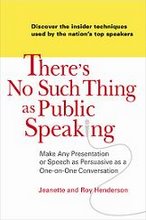Most people will be looking for substantive content in President Bush’s State of the Union Address Tuesday night, but it is not his carefully crafted content that will sway the hearts and minds of Americans. It will be in the way the speech is delivered.
While political pundits will use vague adjectives to momentarily describe the president’s style (strong, weak, tired, flat) before quickly turning to the "meaning" of the content, most Americans will set an opinion of his speech based on HOW he said it rather than what he said. How we feel about the speech will be solely derived from how well Mr. Bush MAKES us feel about it through his delivery.
For the professional speech analyst, the elements that make a speech successful can be measured, counted and scored against specific criteria. For the average American (and political pundit), it simply registers as a gut feeling based on what we expect, and what is needed at that moment in time based on our own experience and desires.
We all instinctively know what characteristics we expect from a President of the United States, and it is only through his own personal presentation that we can know whether or not we are getting it. What is needed for the country at this time is for President Bush to take on a "Father Knows Best" posture. Kind, patient, wise, yet strong and sure of himself, the guidance of a teacher to help us understand more clearly why he’s been making the decisions he has, despite our inability to see those reasons clearly. This must be delivered in a way that is not condescending or defensive, or, as in the case of his Iraq speech earlier this month, overly contrite, so much so as to appear weak.
For the layman, the test is a simple one. When you listen to President Bush speak Tuesday night, ask yourself this. "Does he behave like a President having an important conversation (as opposed to ‘giving a speech’? Am I included in that conversation?" If the answer is "Yes," then the has succeeded in getting you on board, at least for the moment. If the answer is "No," expect the pundits to be vague in their comments about style and merciless in their criticism of his content, despite the fact that his content has almost nothing to do with it.
In the world of politics, where Americans have learned that no message remains constant, this is definitely a stellar case for the old adage, "It’s not WHAT you say, it’s HOW you say it."
Subscribe to:
Post Comments (Atom)


No comments:
Post a Comment